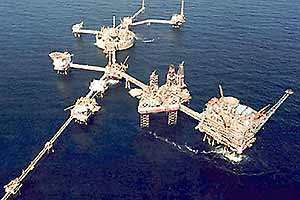January 31, 2007 (the date of publication in Russian)
Alexei Chichkin
NORWAY MAY, RUSSIA MAY NOT?
Russia's main competitor in the European Gas Market doesn’t plan on signing the Energy Charter Treaty
 On January 30 the resolution of the EU Energy Commission comes into effect. This document was signed at the height of the Belarus-Russian gas crisis and calls to decrease import of Russian gas through Belarus and to "import via other transit routes". The EU Energy Council promises a 30-35% subsidy for countries that enter the EU in 2005-2007 via whose territory the gas will flow.
On January 30 the resolution of the EU Energy Commission comes into effect. This document was signed at the height of the Belarus-Russian gas crisis and calls to decrease import of Russian gas through Belarus and to "import via other transit routes". The EU Energy Council promises a 30-35% subsidy for countries that enter the EU in 2005-2007 via whose territory the gas will flow.
Russia is again being pressured to sign the Energy Charter Treaty and to halt "politicalization" (expressed in lower prices for some participants) of its energy resource trade. So both Moscow and Minsk have lost some ground. But who has gained?
Russia's only major competitor in the European gas market is Norway, which has resumed talks on building a branch from the Scandinavian-German pipelines to Poland and the Baltic nations (such talks took place in 2000-2005). Today Norway provides an average 20% of European gas. The UK and Germany – two of Europe's major gas buyers – receive a respective 22 and 25 percent of their gas via a system of five pipelines that run from the Norwegian sector of the North and Norwegian Seas. Denmark and Sweden obtain even more- 47 and 63 percent each. Norway provides gas for 15% of German consumers. In addition, Norwegian and in the near future Danish (this country's sector is adjacent to Norway's) gas will flow through Germany and the UK, Luxembourg and Belgium to France, Switzerland, Austria and the Czech Republic: the deadline for the completion of this project is 2012-2014. Recent deals between Norway's largest oil and gas producers, Statoil and Norsk Hydro, regarding joint development, transport and export strategies reflect Norway's plans for a long-term presence in the European gas market.
The EU considers Oslo its most reliable gas provider, even though Norway hasn't signed the Energy Charter Treaty. In 1991 Norwegians agreed to become observers and to follow the basic guidelines of the document. Norway did not definitely accept any fixed responsibilities.
The status of an observer allows a country to agree with importers and transit governments on any chosen terms, which excludes the influence of transnational corporations on the two parties. Also, an observer, unlike a full member, isn't required to open its gas network to international participation, to instate prices specified by others and to adhere to outside transit rules. An observer does not need to provide detailed information on national energy resources, export and import contracts, processing capacities, internal energy use, and energy-related communications.
In 1991 Norway's then Prime Minister Gro Harlem Brundtland stated: "The Energy Charter Treaty is very advantageous to importing countries, but poses a threat to the national sovereignty of exporters and transit governments." Norway continues its policy of independence from the EU in the energy sector to this day, even though it wants to become a member of the Union. Another major European gas provider, Algiers, is also an observer.
Norway, as we have mentioned above, is not a member of the EU and belongs to another less known European system, the European Free Trade Association (EFTA), created way back in the 1960s. This association unites Switzerland, Iceland, Lichtenstein, San Marino, the Danish autonomies of Greenland and Farers and the European sector of Turkey. The UK, Sweden and Denmark, not part of the Eurocurrency zone, are associated with EFTA as well.
These countries can trade with members of this block as EFTA participants, with mutually agreed -upon prices, barter or using national currencies. That's why Norway sells its gas to EFTA participants and "friends" at significantly lower rates. Outside EFTA Norwegian gas is only 5-11% cheaper than Russian or Algerian gas.
It’s well-known that the Nordstream pipeline project (which Gazprom and its German allies plan to build along the bottom of the Baltic Sea) has caused a wave of protests against an ecological catastrophe from environmentalists in Sweden, the Baltic nations and, of course, Poland.
However, the underwater gas pipelines through which Norwegian gas flows to the UK from the North and Norwegian Seas for some reason never interested the environmentalists… It's amazing that they've forgotten about the World War Two relics: over 1400 drowned battleships and civilian vessels (according to Norwegian and Swedish estimates) and heaven knows how many sleeping mines, bombs, torpedoes and missiles.
Therefore, according to the European Commission Norway is allowed to do everything Russia's forbidden. Norway can afford not to sign the Energy Charter Treaty, sell its gas at significantly lower prices to EFTA members and allies, lay pipelines along the bottom of a sea crammed with explosives from WWII. In the opinion of Brussels there is nothing wrong in all of this. And the EU is acting very surprised when Russia refuses to understand why it has to follow a completely different set of rules…
Number of shows: 1230
 ENG
ENG 

 ENG
ENG 
